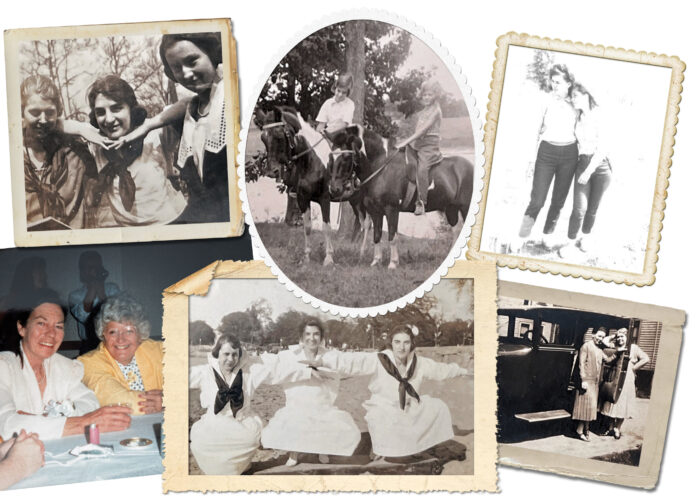I’ll admit I’m always taken aback when a female says “I don’t get along with women. All my friends are men.”
I mean, you do you, sis, but if you truly cannot get along with an entire gender that you share then, in the wise words of almost everyone’s mama, “maybe it’s you?”
I come from a long line of women who valued friendship. My great-grandmother has been gone for 35 years. We still speak fondly of her many friends, including some she had known since her early teaching days.
These women with their bobbed hairstyles and careers when few women had them, would grow into her bridge club buddies with white gloves and pearls. I remember their large brooches and soft powdery scents to this day. Their hugs — and love of butter mints — were legendary.
Her daughter, my grandmother, had lifelong friends as well. They are part of the fabric of our family just as those who share our DNA. These women start out as little girls astride ponies in the 1930s, become young women in rolled-up jeans and saddle shoes with young children in the 1950s snapshots, and later appear in our own childhood photos.
Always present and willing to share some hilarious tales of my Gram before she was a grandmother, they brought the young girl she had been to life in a way she often dismissed.
My mother also has had friends since she was a young girl. They weave into our past and bring it to the present when they reminisce. Their stories became part of our family lore.
I have seen my own daughter grow up with friends since infancy that are her friends today. She has also added new friends throughout the years. All add something to her life — be it a blessing — or a lesson.
Her recent experience with a lifelong friend who has lived away for most of their lives — but still went above and beyond for her wedding — is indicative of the friendships she enjoys
Lessons
I think there are important lessons to be learned in building lifelong friendships. To have a friend you must first be one. It costs nothing to be kind. Invite everyone. Make room at the table. Teach inclusion, not exclusion.
Let’s normalize not saying “girls are just like that.” Show me a “mean girl” and I’ll show you a parent or guardian who shrugged off their responsibility to correct toxic behavior. Girls are not born catty and manipulative. That behavior is learned.
If your friend is nice to you, but not nice to everyone else, then it’s possible your friend is not a nice person.
You don’t have to be close with everyone, but you can acknowledge everyone. Smile. Say hello. Make people feel seen. Be genuine.
Furthermore, being civil and kind to someone you really don’t get along with isn’t being “two-faced.” It’s called being an adult. Learn to walk away from drama. Truly. You do not have to attend every argument you are invited to. Nor is everyone entitled to your opinion. I struggle with these myself. We are all just a work in progress.
Finally, do not “keep your enemies close.” That is terrible advice.
Popularity is pointless
It’s better to have a few very close friends you can count on than an army of acquaintances that you should not.
On that note, not everyone is going to be your “best friend.” In fact, most people won’t be. Keep high standards for your inner circle, but don’t be unrealistic.
Friends are going to let you down. You will let them down. As long as it is exceedingly rare, and not a predictable pattern of behavior, forgiveness can go a long way. Learn from mistakes. When you know better, do better. Learn to apologize and own your missteps. “I’m sorry but …” is not an apology at all.
Friendship is not just about being present for the big stuff. You need to be there for the small stuff. Be present, even if it feels awkward — especially when it does. The times when things are busy, messy and downright inconvenient may just be when friends are needed the most.
Cake. I have a best friend from childhood that is my best friend today. I have friends I’ve known over two decades from our children’s preschool days. Others are from our years spent on the sidelines together, cheering for our collective kids.
I have friends that call ourselves a “Book Club” but we haven’t actually read a book since early 2021. During the pandemic, we met online and laughed until we almost cried. Our grown children tease us that we are really more of a “Cake Club.’’ In every way, these friendships work. Sometimes you just have to let yourselves laugh, cry and eat more cake.













